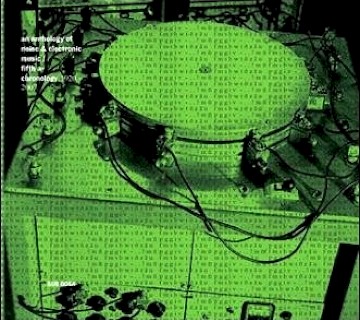
Various – An Anthology Of Noise & Electronic Music / Fifth A-Chronology 1920-2007
The fifth volume of seven published
from 2001 to 2011, curated, noted and edited
by Guy Marc Hinant.
Here I am, for the fifth time, facing this impossible task no one has asked me to do. How can one bring together the history of electronic and concrete music to the history of noise music? For this volume, I want to highlight pieces illustrating a technique (Claude Ballif's Points,Mouvements), a country (Shur, Op. 15 by Alireza Mashayekhi), a studio (Helmut Lachenmann at the IPEM), there are also historic (François Bernard Mâche's Prélude), and radical (Spectrum Ripper by Masonna) works that have ripped apart ancient definitions. All this organized with INTERNATIONALISM in mind and, for once, a focus on the voice - not as sung words, their traditional facet in music (from pop songs to lieder and operas), but as the word itself, recited, distorted, rendered abstract or disaggregated and screamed (the incantation so often a part of rock and noise music).
Sub Rosa presents the fifth volume of the highly-acclaimed and successful Anthology of Noise & Electronic Music series. This installment highlights pieces illustrating a technique (Claude Ballif's "Points, Mouvements"), a country ("Shur, Op. 15" by Alireza Mashayekhi), a studio (Helmut Lachenmann at the IPEM), and historic (François Bernard Mâche's "Prélude"), and radical ("Spectrum Ripper" by Masonna/Yamazaki "Maso" Takushi) works that have ripped apart ancient definitions. All this organized with internationalism in mind and, for once, a focus on the voice -- not as sung words, their traditional facet in music (from pop songs to lieder and operas), but as the word itself, recited, distorted, rendered abstract or disaggregated and screamed (the incantation so often a part of rock and noise music). Like the previous four volumes, this fifth installment is an absolute must for anyone interested in the roots and history of electronic music, with many previously unpublished, rare tracks comprising more than 2 ½ hours of music. The 2CD comes in a deluxe digipack sleeve with an extensive 54-page booklet. The Jazz Loft
CD1
01 Rogelio Sosa Vinylika 7:02
02 Christian Galaretta Marañon (Part VI) 10:25
03 Li Chin Sung aka Dickson Dee Shame (Tetsuo Furudate sound materials remix) 4:58
04 François-Bernard Mâche Prélude 5:30
05 Richard Maxfield Pastoral symphony 4:02
06 Wolf Vostell Elektronicher dé-collage. Happening raum 2:59
07 Charlemagne Palestine Seven organism study 7:53
08 André Boucourechliev Texte 2 4:36
09 Helmut Lachenmann Scenario 12:30
10 Alireza Mashayekhi Shur, op.15 6:29
11 Claude Ballif Points, mouvements 10:14
CD2
01 Mauricio Kagel Antithèse 9:21
02 Vladimir Mayakovsky And Would You? 0:33
03 Raoul Hausmann Fmsbw 0:46
04 Gil Joseph Wolman Mégapneumies (24 Mars 1963) 4:55
05 Léo Kupper Electro-Poème 5:55
06 Josef Anton Riedl Leonce Und Lena 2:18
07 Sten Hanson + Henri Chopin Tête À Tête 5:08
08 Dajuin Yao Satisfaction of oscillation 9:27
09 Pere Ubu Sentimental Journey 7:02
10 Ground Zero Live 1992 0:59
11 Masonna/Yamazaki "Maso" Takushi Spectrum ripper (part I-II-III) 3:33
12 Sutcliffe Jügend Blind ignorance 5:40
13 Club Moral L'enfer est intime 6:33
14 Dub Taylor Lumière (part I) 17:12
Mastered At – Le Laboratoire Central
Credits
- Compiled By [Curated By] – Guy Marc Hinant
- Design – Peter Maybury
- Liner Notes – Guy Marc Hinant
- Liner Notes [English Translation] – François Couture
- Mastered By – Gabriel Séverin
- Producer – Sub Rosa (7)
Notes
Issued in a six panel Digipak. Includes a 56 page booklet attached to the cover.
Mastered at Le Laboratoire Central, Brussels.
Iconography: Morphophone, a machine with then playback heads to replay tape loops in echo, imagined by Pierre Schaeffer and built by Jacques Poullin (circa 1951).
1-1: Previously unreleased track from 2003.
1-2: Part six of a previously unreleased suite from 2004.
1-3: Original track written in 1994. This is a previously unreleased remix from 2007.
1-4: Created at the GRM in 1959.
1-5: Recorded in 1960.
1-6: Sounds from an installation presented at the Venice Biennial in 1968.
1-7: Recorded in 1968.
1-8: Created 1959 for the GRM.
1-9: Recorded in 1965.
1-10: Composed at Gaudeamus Electronic Studio in Bilthoven and at the Utrecht Studio of Sonology in The Netherlands in 1966.
1-11: Recorded in 1962.
2-1: Recorded in 1962.
2-2: Recorded in 1920, restructured in the late 1930s.
2-3: Written in 1918, recorded in 1956-57.
2-4: Written in 1950, recorded live in 1963.
2-5: Recorded between 1963 and 1970, a work for twelve young girls and boys.
2-6: Recorded in 1963.
2-7: Recorded at Fylkingen Studio in Stockholm, 1973.
2-8: Previously unreleased unedited live recording from 1997.
2-9: Previously unreleased live version from 1978.
2-10: Recorded live at 200000V in Tokyo, March 1992.
2-11: Recorded between 1996 and 1997.
2-12: Previously unreleased track from 2007.
2-13: Recorded live on May 3, 1985, at Staalplaat, Amsterdam. Previously unreleased.
2-14: Part of a two-part work recorded in 1972.